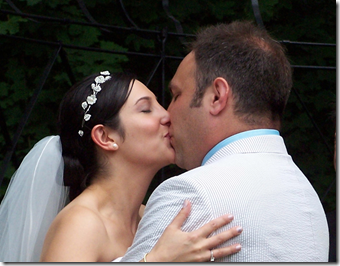I will marry you: 3 things to look for when hiring a wedding officiant
/From a New York Times piece entitled The Officiant Among Us:
FOR generations, getting married meant solemnly standing before an authority figure charged with upholding the rules of civil society or religious traditions.But when Amity Kitchen wed Matthew Saucedo in January, a gregarious family friend, Chris Coughlin, officiated. Mr. Coughlin’s credentials for performing the ceremony? He clicked his mouse at a site offering ordination as a Universal Life Church minister, joining the ranks of Web-blessed clergy who are becoming an increasingly popular choice to preside over weddings.
“Neither Matt nor I are very religious,” Ms. Kitchen said. “The thought of just randomly picking someone to perform this meaningful ceremony, that just didn’t make sense.”
I became an ordained minister of the Universal Life Church thinking that someday there might DJ client also in need of a wedding officiant, and I might be able to fill this role for them as well. To be honest, I thought the chances of me being hired as a minster were slim, but since becoming ordained in 2002, I have presided over a dozen wedding ceremonies, including the ceremonies of two close friends, and three baby naming ceremonies.
One family actually considers me their family minster.
When Elysha and I were married in 2006, a friend also ordained by The Universal Life Church married us.
So I fully support the shift from traditionally ordained religious folk to less formal but more personal officiants, but I also advise using caution when choosing a friend or relative to preside over your wedding ceremony. After providing the music for more than one hundred ceremonies over the past decade, I have seen some less than stellar performances.
When choosing your officiant, traditionally ordained or otherwise, I believe that three important qualities should be considered:
1. The volume of the officiant’s voice
As a DJ, I have seen far too many ceremonies marred by a minister or justice of the peace who cannot be heard by the guests.
Sure, the officiant could use a microphone, but then you suffer the disparity of volume between the officiant and the bride and groom and anyone else speaking or reading.
You could also provide a microphone for everyone speaking at the ceremony, bride and groom included, but this adds a level of complexity that almost guarantees a problem. Either you are placing a lavaliere microphone on the bride’s dress (never a good idea), shoving a microphone in her face as she speaks (even worse), or she is holding a microphone during her ceremony.
All bad options.
There are plenty of people who can officiate a wedding. Why choose a wizened old man or a grandmotherly old lady? Instead, choose someone like me who can speak in a voice that can be heard loud and clear.
2. The ability of the officiant to speak extemporaneously
Too often I have seen brides and grooms choose a friend or relative to officiate a wedding, only to see the officiant bury his or her head in the book, never to be seen again. You want an officiant who can speak to an audience with a level of comfort that allows for frequent eye contact, an occasional smile and a relaxed disposition.
As much as you might love Cousin Henry, if he can’t get his head out of the book, it won’t matter if he is officiating your wedding since no one will ever see him.
3. Experience
Choose an officiant with a modicum of wedding experience, even if that experience is as a guest at many weddings. I have seen people officiate ceremonies who have attended so few wedding in their lifetimes that the basic structure and flow of a ceremony is a mystery to them. Not only does this often make for a stilted, uncertain performance, but it does not allow the officiant to act quickly with good judgment when something goes wrong, as it often does.
It’s one of the most important days of your life. Don’t trust it to a complete amateur.
